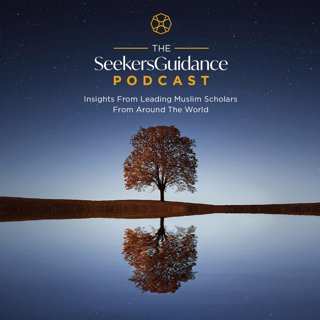
Getting to Know Allah Through Fasting – Imam Siraj Wahhaj
In this Friday sermon, Imam Siraj Wahhaj reflects on the purpose an benefits of fasting. He reflects on verse 184 from Surat al-Baqara: وَأَن تَصُومُوا خَيْرٌ لَّكُمْ ۖ إِن كُنتُمْ تَعْلَمُونَ And fasting is better for you if only you knew. Imam Siraj encourages everyone to fast the month of Ramadan and establish the pillars of Islam. He highlights that Allah Most High is in no need of our fast. However, we fast to come to know Allah and for our own benefit. Watch "Why Imam Siraj Wahhaj Loves SeekersHub" https://youtu.be/JUxm2YfvcdU This Friday sermon was delivered at Sayeda Khadija Centre (http://www.skcentre.com/) in Mississauga, on June 9th, 2017. Join our Ramadan 2017 program: #RamadanRenewal, in-person at SeekersGuidance Toronto or online through the SeekersGuidance Global platform. For more details, visit http://seekershub.org/ramadan2017. Help Seekersguidance build a Global Islamic Seminary and spread the light of guidance to millions around the world by supporting us through a monthly donation by going to https://seekersguidance.org/donate - your donations are tax-deductible in the US and Canada. Check out all of the SeekersGuidance podcasts by visiting https://seekersguidance.org/podcasts/.
14 Juni 201725min

15: Seclusion & the Preservation of Faith – Renewal by the Book: Quran Tafsir Based on Imam Ghazali’s Ihya – Shaykh Faraz Rabbani
In this lesson, Shaykh Faraz Rabbani, reviews verses from the Quran that correspond with the chapter on Seclusion and the Preservation of Faith from Imam Ghazali’s Ihya. The verses covered in this lesson are from the 18th chapter of the Quran on the people of the Cave, verses 9-16. The story of the people of the Cave in the Quran focuses on the points of guidance from this story, that’s why the details of their story are not mentioned in the Quran like other Biblical traditions. The reason that reading this Chapter every Friday is to renew one’s faith. That is why the central message of the chapter is the preciousness and preservation of faith. The preservation of one’s faith is done through seclusion or migration. Here, seclusion is not an ends in itself but it is separate one from evil and its people with one’s heart and action even if one is amongst them. The physical seclusion is to give one the strength for the spiritual seclusion from their action. أَمْ حَسِبْتَ أَنَّ أَصْحَابَ الْكَهْفِ وَالرَّقِيمِ كَانُوا مِنْ آيَاتِنَا عَجَبًا إِذْ أَوَى الْفِتْيَةُ إِلَى الْكَهْفِ فَقَالُوا رَبَّنَا آتِنَا مِن لَّدُنكَ رَحْمَةً وَهَيِّئْ لَنَا مِنْ أَمْرِنَا رَشَدًا Or have you thought that the companions of the cave and the inscription were, among Our signs, a wonder? [Mention] when the youths retreated to the cave and said, "Our Lord, grant us from Yourself mercy and prepare for us from our affair right guidance.” [Quran, 18:9-10] Here, the verses mention mercy and what is meant by that mercy is faith and guidance. The story itself showcases the high levels of taqwa that the people of the cave had in their attempts to preserve their faith. As such, one should always strive to preserve what they’ve been blessed with from Allah. هَٰؤُلَاءِ قَوْمُنَا اتَّخَذُوا مِن دُونِهِ آلِهَةً ۖ لَّوْلَا يَأْتُونَ عَلَيْهِم بِسُلْطَانٍ بَيِّنٍ ۖ فَمَنْ أَظْلَمُ مِمَّنِ افْتَرَىٰ عَلَى اللَّهِ كَذِبًا وَإِذِ اعْتَزَلْتُمُوهُمْ وَمَا يَعْبُدُونَ إِلَّا اللَّهَ فَأْوُوا إِلَى الْكَهْفِ يَنشُرْ لَكُمْ رَبُّكُم مِّن رَّحْمَتِهِ وَيُهَيِّئْ لَكُم مِّنْ أَمْرِكُم مِّرْفَقًا These, our people, have taken besides Him deities. Why do they not bring for [worship of] them a clear authority? And who is more unjust than one who invents about Allah a lie?" [The youths said to one another], "And when you have withdrawn from them and that which they worship other than Allah, retreat to the cave. Your Lord will spread out for you of His mercy and will prepare for you from your affair facility." [Quran, 18:15-16] Verses 15 and 16 show us that one should be vigilant in what they choose to associate with and what they choose to disassociate with. A believer should be clear about what is the truth, right and good and holds fast to it. In addition, Shaykh Faraz reminds us that we dislike the action and not the person, and disassociate with the action and not people. Lastly, Shaykh Faraz concludes with a quote from Imam Ibn ‘Ajiba and Imam Ibn ‘Ata’illah that whoever dedicates themselves to Allah, Allah will reward them, protect them and shields there heart. To do this one should take some time for seclusion to reflect, pray, and remember Allah. For a more detailed description of the entire Chapter on the People of the Cave, check out Shaykh Waleed Mosaad’s podcast: https://seekersguidance.org/show/01-giving-life-surah-kahf-shaykh-walead-mosaad/ In this series Shaykh Faraz, and the other scholars and teachers will be looking at points of reflection from key verses in the Quran. The series will follow the thematic order of Imam Ghazali’s Ihya Ulum al-Din (Renewing the Religious Sciences). The aim is to connect the key verses of guidance from the Book of Allah with the blueprint of renewal, the Ihya, so that we experience a renewal by The Book. Join our Ramadan 2017 program: #RamadanRenewal, in-person at SeekersGuidance Toronto or online through the SeekersGuidance Global platform. For more details, visit: http://seekershub.
13 Juni 201730min

16: Etiquettes of Seclusion – Renewing Religion: An Overview of Ghazali’s Ihya – Shaykh Riad Saloojee
In this class, visiting scholar, Shaykh Riad Saloojee, gives an overview of Imam Ghazali’s chapter on the Etiquettes of Seclusion from the book Ihya Ulum al-Din. Shaykh Riad delves into the benefits and harms of seclusion that one should keep in mind. The benefits of seclusion: [1] Taking time to reflect and remember Allah, which leads to solace and connectedness of the heart with Allah [2] Saving oneself from being in situations of disobedience [3] Avoiding ostentation or doing actions of obedience for others instead of for Allah. [4] To be safe from disputation and partisanship [5] Being away from the harm that may acrew to me because I deal with people [6] Be away from the inclinations of wanting to please others or engage in worldly matters [7] Shields one from interacting with people who are ignorant and the possibility of not responding properly to them The harms of seclusion or the benefits of interacting with others: [1] Learning knowledge and teaching others [2] Benefiting people with one’s time and resources [3] Taking benefit from people and earning a livelihood [4] Training oneself and disciplining oneself and character; and assisting others in that [5] Loneliness and missing out on companionship with others [6] The chance to earn reward and give others the chance to earn rewards Balancing between the two depends on who you are interacting with and what your intention is in both seclusion and in interacting with others. Thus one should aim for beneficial interaction and seclusion when necessary. Shaykh Riad reminds us that continuous interaction with others who are not righteous we will get used to seeing these acts of disobedience and it will become normalized. This also goes to interactions on social media or through television. Shaykh Riad concludes by advising us to pick a routine time for seclusion every day to engage in remembrance and in reflection. The recommendation is to take 5 min after every prayer. The more one does this the more patient one becomes with seclusion and the deeper your reflections will become. In addition, try to sit after fajr till sunrise because there is great reward in that. In this brief overview of Imam Ghazali’s opus magnum, Ihya Ulum al-Din (Renewing the Religious Sciences), this series will serve as blueprint for how the believer can bring to life their religion. It will aim to help the believer to not just practice the form of the religion properly, but to also practice it with excellence. Join our Ramadan 2017 program: #RamadanRenewal, in-person at SeekersGuidance Toronto or online through the SeekersGuidance Global platform. For more details, visit: http://seekershub.org/ramadan2017. Checkout all of the SeekersGuidance podcasts by visiting https://seekersguidance.org/podcasts/
13 Juni 201730min

14: Duties of Brotherhood – Renewal by the Book: Quran Tafsir Based on Imam Ghazali’s Ihya – Shaykh Faid Said
In this lesson, we are joined by visiting scholar, Shaykh Faid Said as he gives an overview of the chapter on Duties of Brotherhood from Imam Al-Ghazali’s Ihya and the verses from the Quran that correspond to it. إِنَّمَا الْمُؤْمِنُونَ إِخْوَةٌ فَأَصْلِحُوا بَيْنَ أَخَوَيْكُمْ ۚ وَاتَّقُوا اللَّهَ لَعَلَّكُمْ تُرْحَمُونَ The believers are but brothers, so make settlement between your brothers. And fear Allah that you may receive mercy. [Quran, 49:10] In this ayah Allah tells us that Muslims in all their affairs are brothers and this is exemplified in the way the Prophet, peace be upon him, joined between the companions from Mecca and Madinah. For this reason, Allah tells the Prophet, that it is from Allah’s favor upon him that he brought the hearts of the companions together, such that they were all one heart. The Prophet, peace be upon him, says that the Muslims in their love for one another are like one body, if one part feels pain the rest does. Shaykh Faid explains that brotherhood is one of the requirements of faith. The Prophet, peace be upon him says, that you cannot believe until you love one another. This brotherhood is a mercy from Allah, exalted is He. This is stressed even in the Fatiha, where we address Allah in the plural, as a reminder that we worship Allah by entering the circles of the righteous. Shaykh Faid concludes by reminding us that there are levels of paradise that cannot be attained except through brotherhood. Brotherhood is not only about being there for one another, helping them out when in trouble, but to keep an eye out for them and give them advice when they need it. In this series Shaykh Faraz, and the other scholars and teachers will be looking at points of reflection from key verses in the Quran. The series will follow the thematic order of Imam Ghazali’s Ihya Ulum al-Din (Renewing the Religious Sciences). The aim is to connect the key verses of guidance from the Book of Allah with the blueprint of renewal, the Ihya, so that we experience a renewal by The Book. Join our Ramadan 2017 program: #RamadanRenewal, in-person at SeekersGuidance Toronto or online through the SeekersGuidance Global platform. For more details, visit: http://seekershub.org/ramadan2017. Checkout all of the SeekersGuidance podcasts by visiting https://seekersguidance.org/podcasts/
12 Juni 201725min

15: Duties of Brotherhood – Renewing Religion: An Overview of Ghazali’s Ihya – Shaykh Riad Saloojee
In this lesson, visiting scholar, Shaykh Riad Saloojee gives an overview of the Chapter on Duties of Brotherhood from Imam Al-Ghazali’s Ihya. This chapter is divided into several sections: [1] The virtues of fraternal relations and brotherhood [2] Loving one another for the sake of Allah [3] How one should deal with and interact with people engaging in varying levels of disobedience [4] The criteria for choosing a companion [5] The rights that are due upon us vis a vis others This lesson will focus on the first principles of character and its connection to the spiritual quest to Allah. The first question then is, what is character? Character is what one looks like on the inside, our internal image. Character is dependent on the beauty of one’s heart, and the fruits of a beautified heart is character. The Prophet, peace be upon him, was of the utmost character and he is our guide to the best of character. In fact, the Prophet, peace be upon him, says that the reason he was sent was to perfect our character. As such, whomever is better than you in character is better than you in deen. Shaykh Riad goes on to describe some of the characteristics of those with good character such as respect, patience and truthfulness. Shaykh Riad concludes the lesson by reminding us that our societies and cultures are cultivated through the sum of our individual characters. The key to lifting our institutions and societies is to first begin by beautifying our individual characters. In this brief overview of Imam Ghazali’s opus magnum, Ihya Ulum al-Din (Renewing the Religious Sciences), this series will serve as blueprint for how the believer can bring to life their religion. It will aim to help the believer to not just practice the form of the religion properly, but to also practice it with excellence. Join our Ramadan 2017 program: #RamadanRenewal, in-person at SeekersGuidance Toronto or online through the SeekersGuidance Global platform. For more details, visit: http://seekershub.org/ramadan2017. Checkout all of the SeekersGuidance podcasts by visiting https://seekersguidance.org/podcasts/
12 Juni 201731min

14: The Lawful & The Prohibited – Renewing Religion: An Overview of Ghazali’s Ihya – Shaykh Riad Saloojee
In this lesson, visiting scholar, Shaykh Riad Saloojee gives an overview of the Chapter on The Permissible and The Impermissible from Imam Ghazali’s Ihya. The chapter is divided into the following sections: [1] the virtue of the permissible and the problems of the impermissible [3] the doubtful and how to judge and evaluate between them [4] the extent to which someone should question the gifts they’ve been given [5] what one should do when they have obtained unlawful wealth and would like to turn back to Allah. [6] the relationship between a person and power In this lesson, Shaykh Riad focuses on the first section of the chapter: the virtue of the permissible and the problems of the impermissible. The Prophet, peace be upon him, tells us that actions are either lawful or unlawful, and between the two there are doubtful matters and whoever avoids doubtful matters is free and saved and whoever engages in doubtful matters is walking a difficult path in which they may fall into the impermissible. He continues to say, that every king has a sanctuary and the sanctuary of Allah in His Earth is His prohibitions; meaning that that is where we should not even come close to. Lastly, the Prophet, peace be upon him, says that in each body there is a morsel that if it were to be corrupt the whole body would to and if it were to be healthy then the whole body would be too; that is the heart. With this the Prophet connects the action of the limbs to the impact it has on one’s spiritual heart. Conversely as well a sound spiritual heart will push one to the permissable as well. Shaykh Riad continues to explain that the permissible and impermissible actions have levels. In addition, the lawful matters and unlawful matters can be dependent on their circumstances, so one needs to be smart and thoughtful in understanding the law and the circumstance. Shaykh Riad concludes by reminding us the strength to engage in the halal and avoid the unlawful is derived not by intellectual understandings but through a sound heart and spiritual strength. The door to that is to continually engage in a lot of remembrance on a daily basis. In this brief overview of Imam Ghazali’s opus magnum, Ihya Ulum al-Din (Renewing the Religious Sciences), this series will serve as blueprint for how the believer can bring to life their religion. It will aim to help the believer to not just practice the form of the religion properly, but to also practice it with excellence. Join our Ramadan 2017 program: #RamadanRenewal, in-person at SeekersGuidance Toronto or online through the SeekersGuidance Global platform. For more details, visit: http://seekershub.org/ramadan2017. Checkout all of the SeekersGuidance podcasts by visiting http:s//seekersguidance.org/podcasts/
12 Juni 201728min

Prayer and Charity – Ramadan Renewal Xtra
Struggling to keep on top of your podcast subscriptions? SeekersHub Ramadan Renewal Xtra offers you a bitesize summary of each night's lessons at SeekersHub Toronto this Ramadan. Catch up on the essential lessons, captured by our media team in this special episode. Calculate Zakat Now
11 Juni 201712min

13: The Lawful & The Prohibited – Renewal by the Book: Quran Tafsir Based on Imam Ghazali’s Ihya – Shaykh Riad Saloojee
In this lesson, visiting scholar Shaykh Riad Saloojee reviews verses from the Quran that correspond with the chapter on the Lawful and the Prohibited from Imam Ghazali’s Ihya. Shaykh Riad covers verse 51 from Chapter 23, verse 109 from chapter 9 and verse 23 and 24 from Chapter 83. يَا أَيُّهَا الرُّسُلُ كُلُوا مِنَ الطَّيِّبَاتِ وَاعْمَلُوا صَالِحًا إِنِّي بِمَا تَعْمَلُونَ عَلِيمٌ [ Allah said], "O messengers, eat from the good foods and work righteousness. Indeed, I, of what you do, am Knowing. [Quran, 23:51] In this verse, Allah shows that there is a relationship between what I consume and our spiritual state; as well as between our spiritual state and the actions that follow from that. We must know that there is certainly benefit in all the things Allah has allowed for us to consume and there is harm in all the things Allah has not allowed us to consume. أَفَمَنْ أَسَّسَ بُنْيَانَهُ عَلَىٰ تَقْوَىٰ مِنَ اللَّهِ وَرِضْوَانٍ خَيْرٌ أَم مَّنْ أَسَّسَ بُنْيَانَهُ عَلَىٰ شَفَا جُرُفٍ هَارٍ فَانْهَارَ بِهِ فِي نَارِ جَهَنَّمَ ۗ وَاللَّهُ لَا يَهْدِي الْقَوْمَ الظَّالِمِينَ Then is one who laid the foundation of his building on righteousness [with fear] from Allah and [seeking] His approval better or one who laid the foundation of his building on the edge of a bank about to collapse, so it collapsed with him into the fire of Hell? And Allah does not guide the wrongdoing people. [Quran, 9:109] Shaykh Riad explains that there is a relationship between the inputs we take in of halal food and earning and the output that they yield in terms of spiritual, emotional and intellectual states. That is why Allah instructs us to be wise and careful in what we choose to consume because of the impact it has on our being. كلا بل ران على قلوبهم ما كانوا يكسبون كَلَّا إِنَّهُمْ عَن رَّبِّهِمْ يَوْمَئِذٍ لَّمَحْجُوبُونَ No! Rather, the stain has covered their hearts of that which they were earning. No! Indeed, from their Lord, that Day, they will be partitioned. [Quran, 14-15:83] Those who continually consume that which is unlawful will become spiritually blinded such that they will be no longer able to distinguish between that which is lawful and unlawful. Instead, they will begin to justify it and no longer see it for what it is. Shaykh Riyad warns us, that this then becomes a slippery slope that can lead one very far away from Allah. Lastly, Shaykh Riad reminds us to continually pray that Allah suffices us with the Halal instead of the Haram and allow our hearts to attain freedom through you without need of anyone or anything else. In this series Shaykh Faraz, and the other scholars and teachers will be looking at points of reflection from key verses in the Quran. The series will follow the thematic order of Imam Ghazali’s Ihya Ulum al-Din (Renewing the Religious Sciences). The aim is to connect the key verses of guidance from the Book of Allah with the blueprint of renewal, the Ihya, so that we experience a renewal by The Book. Join our Ramadan 2017 program: #RamadanRenewal, in-person at SeekersGuidance Toronto or online through the SeekersGuidance Global platform. For more details, visit: http://seekershub.org/ramadan2017. Checkout all of the SeekersGuidance podcasts by visiting https://seekersguidance.org/podcasts/
11 Juni 201720min





















